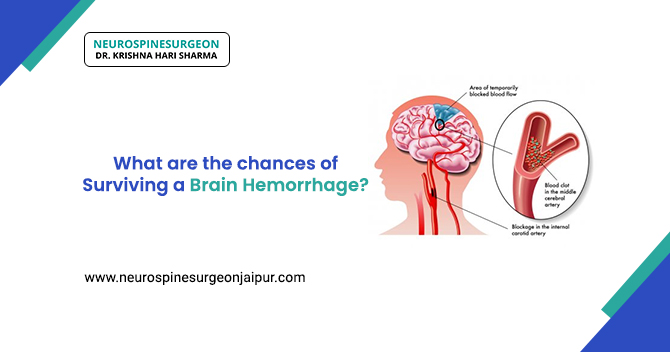
Brain hemorrhage is a condition when there is bleeding inside the brain. It is also a type of stroke. The part of the brain in which bleeding occurs inside the brain lets doctors decide the treatment. Doctors will figure out the condition after adapting the diagnosing techniques and then continue with the treatment. In most conditions, the blood leaks out of the damaged brain into the membrane that covers the brain, and pressure builds upon the brain. It leads to pain and discomfort. It is known as a subdural hematoma.
But it is also important to understand that the chances of surviving a brain hemorrhage highly depend on the condition as well. If the condition is really very severe, then the chances of survival are very small.
Symptoms of Brain Hemorrhage:
If we explore the symptoms of brain hemorrhage, then it is important to understand that there are no warning signs at all. It may happen immediately when someone falls or hits their head. It is impossible to diagnose it at the outset.
Additionally, if the blood vessel wall is wet, then it will swell, and it is known as an aneurysm. An aneurysm is a condition when blood vessels rupture suddenly and bleeding takes place. In most cases, physical activity or a strain is the cause of the rupturing of blood vessels. A person facing such difficulty needs to approach a brain specialist as soon as possible.

During bleeding, a person may experience the following conditions:
- Sudden and severe headaches
- They become sensitive to light.
- Confusion
- Difficulty in moving while walking
- Stiffness in my neck
- Shaking
- Seizures
Along with brain bleed, people may experience symptoms of stroke as well. This majorly includes:
- Arm weakness
- Speech slurring
- Face drooping
What are the chances of surviving a brain hemorrhage?
In general, if we discuss the chances of surviving a brain hemorrhage, then these are only 50%. After survival, a person may have different complications, making it difficult for them to live their life peacefully. Most people have major neurological problems like confusion, memory loss, and some others.
Diagnosis of brain hemorrhage:
When you approach the brain specialist, they will conduct the different diagnosing techniques that are helpful in its diagnosis. They primarily consider:
- CT scan
- MRI
- Lumbar puncture
- X-ray creates a 3D picture of the brain.
Treatment for brain hemorrhage:
When we are talking about treatment for a brain hemorrhage, then it entirely depends on the condition and the part of the brain where the bleeding took place. Let’s discuss some treatment options:
Unruptured aneurysm:
The coiling procedure is the treatment for an unruptured aneurysm. Surgeons utilize the catheter to guide the small metal coil into the aneurysm. It is helpful in stopping the blood from entering the blood vessel and sealing it off from the main artery. It also prevents swelling and bursting later on. Along with that, the doctor also considers keeping a procedure in which they place metal clips at the base of the aneurysm and prevent blood flow.
Medication:
Certain medications are also there that are helpful in relieving pain and act as immediate treatments. It is important to relieve pain because if there is pain, doctors cannot perform any surgery or any other procedure.
Prevention:
People usually don’t know if they suffer from brain bleeds; this is mainly due to the fact that many people experience them at a young age. Possible reasons include genetics, vulnerabilities in their brains, and bad lifestyle choices.
Steps a person can take to prevent a brain bleed are as follows:
- exercising
- Limiting alcohol consumption.
- Eating a healthful diet
- reducing stress
- Stopping smoking
- Limit your intake of salt and fat.
If you have a high risk of a brain bleed, you may be able to reduce your risk with medication or surgery. If you have diabetes, it is important to always work with a medical professional on any treatment decisions.
Overall, it is right to conclude that brain hemorrhage is a serious condition and one cannot avoid it. If you are having any problems, or you know someone who is going to have such difficulty, do approach the best doctor in town. You can visit Jaipur and contact Dr. Krishna Hari Sharma.
He is the best Brain specialist doctor in Jaipur, having years of experience in performing surgeries. You can discuss with him the condition and he will let you know what to do and what not to do. For sure, after treatment, you will be able to get rid of it and will live your life peacefully.
FAQ:
What are the risk factors for a brain hemorrhage?
There are many risk factors for a brain hemorrhage, such as:
- Aged over 60?
- Speed while driving
- Alcohol consumption
- Smoking cigarettes
- high blood pressure and heart disease.
How is the brain affected by a brain hemorrhage?
Brain hemorrhage causes damage to the brain cells that are vital for function. The most concerning issue with this type of injury is that it usually only requires a small amount of bleeding to cause damage. This means that much smaller injuries can lead to serious brain injuries if not cared for immediately.
The following are some common symptoms associated with a brain hemorrhage:
- Seizures
- Confusion
- Loss of consciousness
- Weakness in limbs
How long does it take for a brain hemorrhage to heal?
Typically, a patient’s prognosis depends on how quickly the hemorrhage is diagnosed and treated.
Brain hemorrhages often continue to bleed after treatment because they are not always treated at the bleeding point. This means that most people experience neurological changes in addition to their physical symptoms, which can be quite unpredictable for their loved ones.
It typically takes around three months for a person’s brain hemorrhage to heal completely if they have no complications with it during that time frame.




